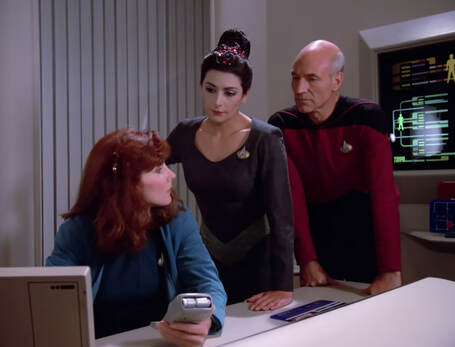Written by John Edward Betancourt  Back in the late 1980s, if you wanted to learn more about a new television series and what other people thought about it, you had to patiently wait to read the reviews in your local newspaper or favorite magazine, or hear about it on your favorite, entertainment related T.V. series. Because there were no immediate hot takes via social media, just good old-fashioned print and broadcast television. But while that seems like an archaic and slow way to get your information, the kind that would allow for networks to spin something bad into a positive, that’s simply not the case. For reviewers were still apt to call a show out when it felt as though something was amiss, or pre-judge a movie or a show before they could find their footing and the next episode of Star Trek: The Next Generation serves as a fine example of how all of this played out. For ‘The Naked Now’ was not a well-received episode back when it debuted. Because a great many reviewers spoke ill of this tale, citing it as ‘derivative’ of The Original Series since this particular tale was in fact, a direct sequel to ‘The Naked Time’ and many also saw the new show going with a sequel story, as a warning sign. In that, TNG wouldn’t have anything new to offer going forward because all it could do was stand in the shadow of the iconic series that came before it, and well, these criticisms definitely have some merit. After all, the crew of the 1701-D do indeed run into a different version of the virus that drove the crew of the original 1701 mad, and just like that episode the clock is ticking in regard to finding a cure before something bad happens and what’s truly incredible, is that the parallels to that classic tale don’t end with there. Because there’s even a pseudo mutiny in Engineering thanks to the virus, something we saw in the original episode. The only difference this time is that there is a lack of serenading from the engine room since Wesley Crusher doesn’t sing. But while one can see why this episode was received poorly and seen as a cause for concern for the future of the series, why exactly the producers chose to greenlight a sequel episode makes sense in the end. Because this was in essence a grand attempt to appease the fanbase by giving them something familiar to work with and something that ties together with Kirk and Spock and McCoy’s original adventures. Granted, a direct sequel clearly didn’t resonate as the powers that be had hoped, but it was an olive branch and an effort on their part to keep fans happy and there really isn’t anything wrong with trying to do the right thing in an unprecedented situation. Plus, there were some bright spots to be found in this tale as well. Since this story really does put the crew of the Enterprise to the test, something that helps the audience and the characters understand just how well they work together as a team, and it also let the actors let loose and have a little fun. Because we got to see a heretofore stoic Captain Picard skip about sickbay since Beverly elicited a little excitement in his heart and this story also allowed for Brent Spiner to showcase his acting skills. Because he does a phenomenal job of playing a drunk version of Data, and truly, the ‘love scene’ with Tasha is one that stays in your mind, thanks to its awkwardness and comedic fallout as well. But what matters most, is that the critics that firmly believed that this episode was an ominous sign that this new series would be short lived and forgotten, called it wrong. Because we would get a total of seven glorious years with this crew and truly, the critics should have been a little kinder to the series back in the day. For year one is always a scary venture for any show, especially one that is following an incredible act, and sequels are a safe space to figure out the voice for a series. Plus, this one gets a pass for being a lot of fun and really, one cannot emphasize enough, the importance of seeing this crew come together in the manner that they do in this tale. Because this lays the foundation for some of the incredible moments to come in the future, and it also serves as a solid reminder of what this franchise stands for. Because Star Trek was always about unity and collective thinking to solve problems over swift violence and it really is nice to see glimmers of tomorrow in this particular tale, since it helps one to forget about any flaws or criticism hanging over the crew’s first real mission together, and instead allows for us look forward to the wonders ahead. Until next time.
0 Comments
Leave a Reply. |
Archives
January 2025
|
|
© 2012-2025, Nerds That Geek LLC.
All Rights Reserved. |
uWeb Hosting by FatCow

 RSS Feed
RSS Feed